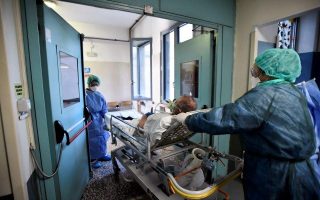EU goal of full vaccine coverage by end-2021 within reach, says health commissioner

The European Union’s target to have secured enough vaccinations against the novel coronavirus to inoculate every citizen in the bloc by the end of 2021 is within reach, Commissioner for Health and Food Safety Stella Kyriakides told Kathimerini in Brussels on Monday.
“We are also ready to help expand the production capacity of pharmaceutical firms,” she added, noting that Germany’s BioNTech is already adapting the former Novartis production plant in Marburg to support manufacturing by its vaccine candidate from February, and is also expected to apply for an additional production location.
Once the application is made, Kyriakides said, the European Medicines Agency (EMA) and the Commission will “support this expansion with swift procedures, if we see that all standards are being met.”
Following the furor last week over Germany’s parallel agreement with Pfizer-BioNTech, the president of Cyprus, Nicos Anastasiades, said that he is in talks with Israel to secure additional doses. Doesn’t the legal obligation of EU member-states not to negotiate vaccine supplies outside the framework of the bloc extend to third countries?
Our process, and the legal obligations stemming from it, concerns negotiations with pharmaceutical firms for pre-order agreements. As far as possible contacts with third countries are concerned, we do not have the detailed data right now that would allow me to comment. That said, we are drafting a letter to member-states’ health ministers asking for information on how and to what degree they are upholding the common strategy and its provisions regarding parallel deals.
How do you explain the frustratingly slow pace of vaccinations in certain member-states?
I had repeatedly warned that if and when a safe vaccination were found, it would not be some magic overnight solution to the pandemic. It takes time and a great deal of effort and persistence to get vaccination campaigns moving in every member-state. But the process will speed up soon and the situation will improve. We are also waiting for good news from other manufacturers so that we have greater coverage. I know that people are frustrated and want to get back to normal as soon as possible, and this is why we are mobilized at every level to speed up any procedure that may be holding up the process.
Could the Commission have done more to this end?
The European Commission acted swiftly, creating the broadest portfolio of vaccine candidates in the world, with at least six manufacturers, and also by funding the research. No one knew six months ago which manufacturer would arrive at a safe and effective vaccine first. We invested significant resources – 2.75 billion euros – for access to different technologies. Part of the money was used to support production capacity. The EU has so far secured more than 2 billion doses for its 27 member-states. Every head of state expressed satisfaction with the Commission’s approach at the EU summits of October 15-16 and last June.
Can member-states expect 60% coverage of their population by the end of the first half of 2021, or has that train left the station?
We have just approved the second safe and effective vaccination, by Moderna, which together with that developed by BioNTech-Pfizer, will ensure that 760 million doses are available to the EU within 2021, at an increasingly rapid pace. Member-states also need to ensure that the pace of vaccinations continues and increases, without hindrance. We may have good results from other vaccine producers soon and this will allow us to increase supply. But all this takes time, and until then we need to continue applying measures to relieve the pressure on our health systems.
The EU has come under criticism for the relatively slow pace of vaccine approval by its Medicines Agency. Is it true that the EMA remains too transfixed on procedures that are designed for normal times but may not be suitable in the current conditions?
The EMA has approved two vaccinations in record time and is already in the process of approving another two, so I think that it has responded very well to this emergency. It approves distribution licenses quickly and is constantly monitoring reports of possible side effects after a vaccine’s circulation. It has set up a European database with reports from patients, health professionals and researchers that allows it to identify potential risks and take any steps that may be needed. It also exchanges information with the World Health Organization and drug regulators in different countries, so as to keep up with any issues that may arise in other parts of the world.





